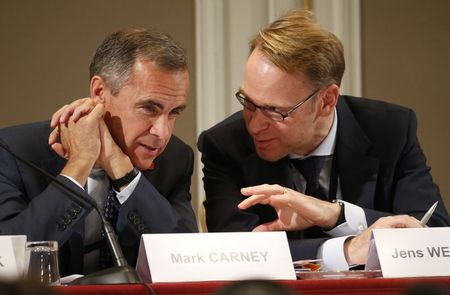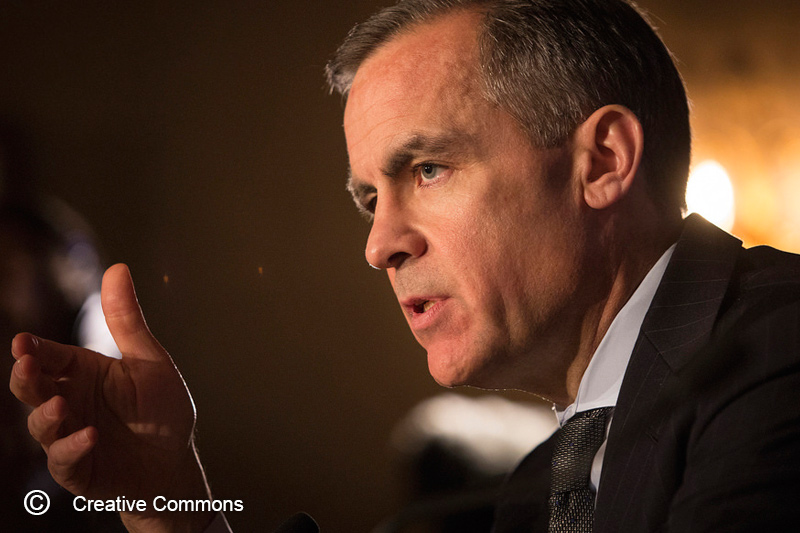By Joshua Franklin and Huw Jones
BASEL Switzerland/LONDON (Reuters) - Banks may have to scrap dividends and rein in bonuses if they breach new rules designed to ensure that creditors rather than taxpayers pick up the bill when big lenders collapse.
Mark Carney, chairman of the Financial Stability Board and Bank of England governor, said the rules, proposed on Monday, marked a watershed in putting an end to taxpayer bailouts of banks considered too big to fail.
"Once implemented, these agreements will play important roles in enabling globally systemic banks to be resolved (wound down) without recourse to public subsidy and without disruption to the wider financial system," Carney said in a statement.
After the financial crisis in 2007-2009, governments had to spend billions of dollars of taxpayer money to rescue banks that ran into trouble and could have threatened the global financial system if allowed to go under.
Since then, regulators from the Group of 20 economies have been trying to find ways to prevent this happening again.
The plans envisage that global banks like Goldman Sachs (N:GS) and HSBC (L:HSBA) should have a buffer of bonds or equity equivalent to at least 16 to 20 percent of their risk-weighted assets, such as loans, from January 2019.
These bonds would be converted to equity to help shore up a stricken bank. The banks' total buffer would include the minimum mandatory core capital requirements banks must already hold to bolster their defences against future crises.
The new rule will apply to 30 banks the regulators have deemed to be globally "systemically important," though initially three from China on that list of 30 would be exempt.
G2O leaders are expected to back the proposal later this week in Australia. It is being put out to public consultation until Feb. 2, 2015.
David Ereira, a partner at law firm Linklaters, said that on its own the new rule as proposed would not end "too big to fail" banks and that politically tricky details still had to be settled.
BASEL TOWER
Carney was confident the new rule would be applied as central banks and governments had a hand in drafting them.
"This isn't something that we cooked up in Basel tower and are just presenting to everybody," he told a news conference, referring to the FSB's headquarters in Switzerland.
Most of the banks would need to sell more bonds to comply with the new rules, the FSB said. Some bonds, known as "senior debt" that banks have already sold to investors, would need restructuring.
Senior debt was largely protected during the financial crisis, which meant investors did not lose their money. But Carney said it in future these bonds might have to bear losses if allowed under national rules and if investors were warned in advance.
The new buffer, formally known as total loss absorbing capacity or TLAC, must be at least twice a bank's leverage ratio, a separate measure of capital to total assets regardless of the level of risk.
Globally, the leverage ratio has been set provisionally at 3 percent but it could be higher when finalised in 2015.
Some of the buffer must be held at major overseas subsidiaries to reassure regulators outside a bank's home country. Banks may have to hold more than the minimum because of "add-ons" due to specific business models, Carney said.
Elke Koenig, president of German regulator Bafin, said supervisors should orient themselves more toward the upper end of the 16-20 percent range, though banks may be given more time to comply.
Fitch ratings agency said banks might end up with a buffer equivalent to as much as a quarter of their risk-weighted assets once other capital requirements were included. Analysts have estimated this could run to billions of dollars.
Analysts at Citi (N:C) estimated the new rule could cost European banks up to 3 percent of profits in 2016.
Citi said European banks would be required to issue the biggest chunk of new bonds, including BNP Paribas (PA:BNPP), Deutsche Bank (DE:DBKGn), BBVA (MC:BBVA) and UniCredit (MI:CRDI), with Swiss and British banks the least affected in Europe.
(Additional reporting by Alexander Huebner in Bonn, Editing by Keiron Henderson and Jane Merriman) By Joshua Franklin and Huw Jones
BASEL Switzerland/LONDON (Reuters) - Banks may have to scrap dividends and rein in bonuses if they breach new rules designed to ensure that creditors rather than taxpayers pick up the bill when big lenders collapse.
Mark Carney, chairman of the Financial Stability Board and Bank of England governor, said the rules, proposed on Monday, marked a watershed in putting an end to taxpayer bailouts of banks considered too big to fail.
"Once implemented, these agreements will play important roles in enabling globally systemic banks to be resolved (wound down) without recourse to public subsidy and without disruption to the wider financial system," Carney said in a statement.
After the financial crisis in 2007-2009, governments had to spend billions of dollars of taxpayer money to rescue banks that ran into trouble and could have threatened the global financial system if allowed to go under.
Since then, regulators from the Group of 20 economies have been trying to find ways to prevent this happening again.
The plans envisage that global banks like Goldman Sachs (N:GS) and HSBC (L:HSBA) should have a buffer of bonds or equity equivalent to at least 16 to 20 percent of their risk-weighted assets, such as loans, from January 2019.
These bonds would be converted to equity to help shore up a stricken bank. The banks' total buffer would include the minimum mandatory core capital requirements banks must already hold to bolster their defences against future crises.
The new rule will apply to 30 banks the regulators have deemed to be globally "systemically important," though initially three from China on that list of 30 would be exempt.
G2O leaders are expected to back the proposal later this week in Australia. It is being put out to public consultation until Feb. 2, 2015.
David Ereira, a partner at law firm Linklaters, said that on its own the new rule as proposed would not end "too big to fail" banks and that politically tricky details still had to be settled.
BASEL TOWER
Carney was confident the new rule would be applied as central banks and governments had a hand in drafting them.
"This isn't something that we cooked up in Basel tower and are just presenting to everybody," he told a news conference, referring to the FSB's headquarters in Switzerland.
Most of the banks would need to sell more bonds to comply with the new rules, the FSB said. Some bonds, known as "senior debt" that banks have already sold to investors, would need restructuring.
Senior debt was largely protected during the financial crisis, which meant investors did not lose their money. But Carney said it in future these bonds might have to bear losses if allowed under national rules and if investors were warned in advance.
The new buffer, formally known as total loss absorbing capacity or TLAC, must be at least twice a bank's leverage ratio, a separate measure of capital to total assets regardless of the level of risk.
Globally, the leverage ratio has been set provisionally at 3 percent but it could be higher when finalised in 2015.
Some of the buffer must be held at major overseas subsidiaries to reassure regulators outside a bank's home country. Banks may have to hold more than the minimum because of "add-ons" due to specific business models, Carney said.
Elke Koenig, president of German regulator Bafin, said supervisors should orient themselves more toward the upper end of the 16-20 percent range, though banks may be given more time to comply.
Fitch ratings agency said banks might end up with a buffer equivalent to as much as a quarter of their risk-weighted assets once other capital requirements were included. Analysts have estimated this could run to billions of dollars.
Analysts at Citi (N:C) estimated the new rule could cost European banks up to 3 percent of profits in 2016.

Citi said European banks would be required to issue the biggest chunk of new bonds, including BNP Paribas (PA:BNPP), Deutsche Bank (DE:DBKGn), BBVA (MC:BBVA) and UniCredit (MI:CRDI), with Swiss and British banks the least affected in Europe.
(Additional reporting by Alexander Huebner in Bonn, Editing by Keiron Henderson and Jane Merriman)
